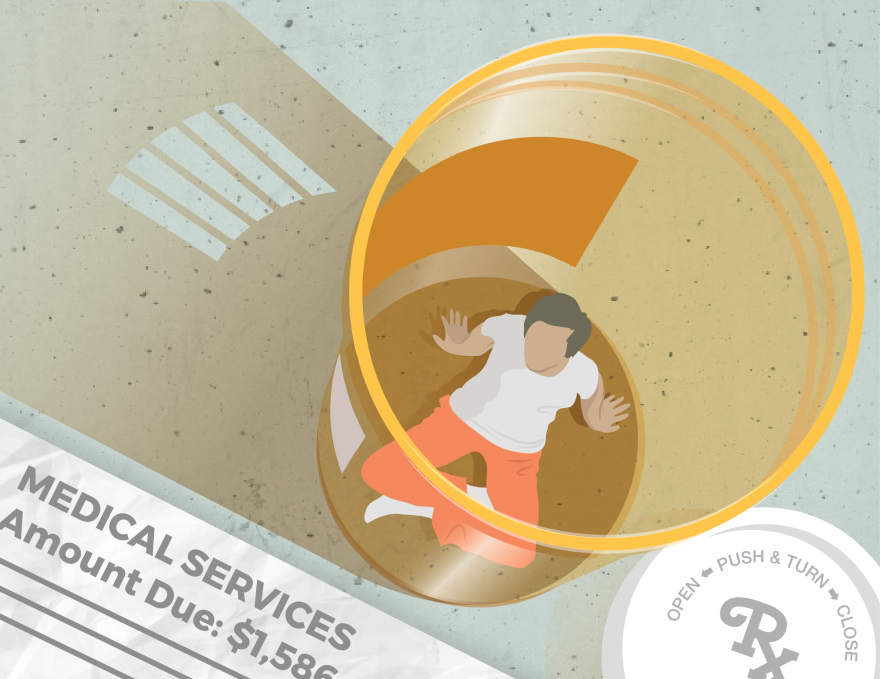A St. Louis aldermanic committee has given its approval to a bill that would use federal money to pay the medical debt of thousands of St. Louisans.
The five-member Housing, Urban Development and Zoning Committee voted this week to send the bill to the full Board of Aldermen with the recommendation of “do pass.”
The bill introduced by 14th Ward Alderman Rasheen Aldridge would allocate $800,000 of American Rescue Plan funds to forgive medical debts of those who qualify.
“It’s really a penny on the dollar,” Aldridge said during this week's committee meeting. “I don’t think there’s a way we can utilize these one-time federal funds besides relieving debt from individuals that got sick during the pandemic.”
Aldridge said the funds would likely be fielded by RIP Medical Debt, a nonprofit that buys medical debts in bundles from collectors for a discounted sum. The organization then pays off the debt.
Representatives of RIP Medical Debt said the $800,000 in federal pandemic relief funds could cancel millions worth of medical bills.
“The average balance we typically find is in the $2,200-$2,500 range when we work with hospitals,” RIP Medical Debt Advisor Keith Hearle said. “We could help roughly 32,000 to 35,000 members of the cities with this resource.”
The organization works with a government agency to allocate the funds. It asks area hospitals to show their portfolios of medical debt and identifies people who would be qualified to have their debt paid by the nonprofit, Hearle said.
That refers to people who earn up to 40% of the federal poverty level, or around $15,000, or those whose medical debt is disproportionately high related to their income, he said.
That refers to people who earn up to 400% of the federal poverty level, about $60,000, or about $120,000 for a household of four — or those whose medical debt is disproportionately high related to their income, he said.
“One of the most powerful things behind that ratio is the fair market value of medical debt portfolios once they get to be 18 months to 12 years old,” Hearle said. “The marketplace is under a dollar, so with a dollar we can then cancel 100 dollars of medical debt.”
Representatives from RIP Medical Debt told the committee they believe the organization is the only one in the country that performs that service. Thus it would be the likely vendor for the bill.
Aldridge said forgiving medical debt could help raise credit scores for people in low-income neighborhoods.
That helped win the support of other members of the committee.
“The American Rescue Plan Act was intended to help people recover from the pandemic,” said 9th Ward Alderman Michael Browning. “And it makes a lot of sense to target medical debt, whether it’s the result of the pandemic or just in general our terrible health care system which makes people go into debt.”
Arizona, Chicago and other jurisdictions have worked with RIP Medical Debt to use ARPA funds to pay off medical bills. Before the pandemic, the organization was funded through philanthropic donations, Hearle said.
Under the bill, the $800,000 would be directed first to the Health Department. The money would be redirected from a fund that the board established last year designed to pay for logistical support for residents who were seeking abortions.
Missouri Attorney Andrew Bailey sued the city to stop the abortion fund, and the money that was earmarked for that support is now available to use, said Casey Millburg, a policy director for St. Louis Mayor Tishaura Jones.
If the full board approves the medical debt forgiveness bill, there will still be nearly $500,000 left to be reappropriated, Millburg said. City officials plan to use that to pay for maternal health initiatives.
Correction: Medical debt forgiveness would be available to people who earn up to 400% of the federal poverty level, about $60,000, or about $120,000 for a household of four. An earlier version of this story misstated the income level of those who would qualify.






